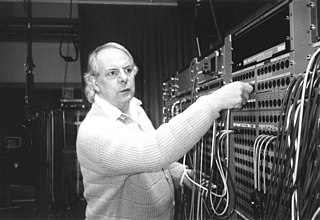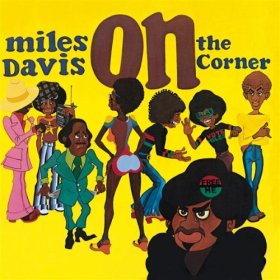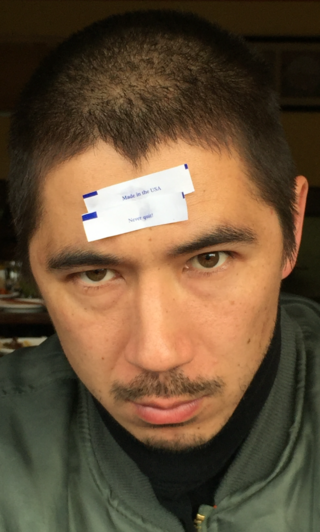Electronic music broadly is a group of music genres that employ electronic musical instruments, circuitry-based music technology and software, or general-purpose electronics in its creation. It includes both music made using electronic and electromechanical means. Pure electronic instruments depended entirely on circuitry-based sound generation, for instance using devices such as an electronic oscillator, theremin, or synthesizer. Electromechanical instruments can have mechanical parts such as strings, hammers, and electric elements including magnetic pickups, power amplifiers and loudspeakers. Such electromechanical devices include the telharmonium, Hammond organ, electric piano and electric guitar.

Karlheinz Stockhausen was a German composer, widely acknowledged by critics as one of the most important but also controversial composers of the 20th and early 21st centuries. He is known for his groundbreaking work in electronic music, having been called the "father of electronic music", for introducing controlled chance into serial composition, and for musical spatialization.
Musique concrète is a type of music composition that utilizes recorded sounds as raw material. Sounds are often modified through the application of audio signal processing and tape music techniques, and may be assembled into a form of sound collage. It can feature sounds derived from recordings of musical instruments, the human voice, and the natural environment as well as those created using sound synthesis and computer-based digital signal processing. Compositions in this idiom are not restricted to the normal musical rules of melody, harmony, rhythm, and metre. The technique exploits acousmatic sound, such that sound identities can often be intentionally obscured or appear unconnected to their source cause.

The Red Hot Chili Peppers are an American rock band formed in Los Angeles in 1982, comprising vocalist Anthony Kiedis, bassist Flea, drummer Chad Smith, and guitarist John Frusciante. Their music incorporates elements of alternative rock, funk, punk rock, hard rock, hip hop, and psychedelic rock. Their eclectic range has influenced genres such as funk metal, rap metal, rap rock, and nu metal. With over 120 million records sold worldwide, the Red Hot Chili Peppers are one of the top-selling bands of all time. They hold the records for most number-one singles (15), most cumulative weeks at number one (91) and most top-ten songs (28) on the Billboard Alternative Songs chart. They have won three Grammy Awards, were inducted into the Rock and Roll Hall of Fame in 2012, and in 2022 received a star on the Hollywood Walk of Fame.

György Sándor Ligeti was a Hungarian-Austrian composer of contemporary classical music. He has been described as "one of the most important avant-garde composers in the latter half of the twentieth century" and "one of the most innovative and influential among progressive figures of his time".

Bill Callahan is an American singer-songwriter, who has also recorded and performed under the band name Smog. Callahan began working in the lo-fi genre, with home-made tape-albums recorded on four-track tape recorders. Later he began releasing albums with the label Drag City, to which he remains signed today.

The EMS Synthi 100 was a large analogue/digital hybrid synthesizer made by Electronic Music Studios, London, originally as a custom order from Radio Belgrade for what was to be the Radio Belgrade Electronic Studio, largely thanks to contact between composer Paul Pignon, then living in Belgrade, and Peter Zinovieff. The synthesiser was designed by David Cockerell and documented in detail in 1971. The cost at that time was £6,500. The last unit built by EMS was number 30. Afterwards, one final unit was built by Datanomics, who bought assets from EMS when the company folded in 1979. The redesigned unit was sold to Gabinete de Música Electroacústica, Cuenca, Spain.

On the Corner is a studio album by the American jazz trumpeter, bandleader, and composer Miles Davis. It was recorded in June and July 1972 and released on October 11 of that year by Columbia Records. The album continued Davis' exploration of jazz fusion, and explicitly drew on the influence of funk musicians Sly Stone and James Brown, the experimental music of Karlheinz Stockhausen, the free jazz of Ornette Coleman, and the work of collaborator Paul Buckmaster.
S.E.M. Ensemble is an American group dedicated to the performance of contemporary classical music. It was founded in 1970 by the Czech composer Petr Kotik, who serves as its director, and is based in New York City.
David C. Johnson was an American composer, flautist, and performer of live electronic music.

"Mr. Blue Sky" is a song by the Electric Light Orchestra (ELO), featured on the band's seventh studio album Out of the Blue (1977). Written and produced by frontman Jeff Lynne, the song forms the fourth and final track of the "Concerto for a Rainy Day" suite on side three of the original double album. "Mr. Blue Sky" was the second single to be taken from Out of the Blue, peaking at number 6 in the UK Singles Chart and number 35 in the US Billboard Charts.
Werner Meyer-Eppler, was a Belgian-born German physicist, experimental acoustician, phoneticist and information theorist.

The Lemp Neighborhood Arts Center (LNAC), also known as "The Lemp," is a non-profit performance space, art gallery, and community center located in the historic Benton Park neighborhood of St. Louis, Missouri. Since its founding in March 1994, the organization has been among the forefront of art spaces committed to the DIY ethic in St. Louis and the Midwest, holding the position as one of the oldest all-ages "Do-It-Yourself" music venues in the region and in the United States, alongside ABC No Rio in New York City, 924 Gilman Street in Berkeley, California, and the Ché Café in La Jolla, California.
Die Reihe was a German-language music academic journal, edited by Herbert Eimert and Karlheinz Stockhausen and published by Universal Edition (Vienna) between 1955 and 1962. An English edition was published, under the original German title, between 1957 and 1968 by the Theodore Presser Company in association with Universal Edition (London). A related book series titled "Bücher der Reihe" was begun, but only one title ever appeared in it, Herbert Eimert's Grundlagen der musikalischen Reihentechnik.
Rolf Rainer Gehlhaar was an American composer, Professor in Experimental Music at Coventry University and researcher in assistive technology for music.

Harald Bode was a German engineer and pioneer in the development of electronic musical instruments.

Donnerstag aus Licht is an opera by Karlheinz Stockhausen in a greeting, three acts, and a farewell, and was the first of seven to be composed for the opera cycle Licht: die sieben Tage der Woche. It was written between 1977 and 1980, with a libretto by the composer.
Spatial music is composed music that intentionally exploits sound localization. Though present in Western music from biblical times in the form of the antiphon, as a component specific to new musical techniques the concept of spatial music was introduced as early as 1928 in Germany.

Jeff Witscher is an American electronic musician.

Bánh Mì Verlag is an experimental music record label based in Queens, New York City, USA.












